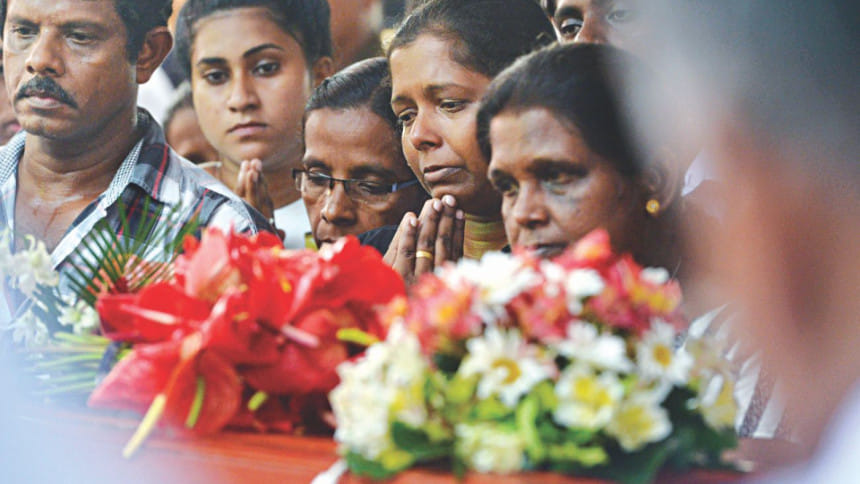LANKA MOURNS

Sri Lankans wept and prayed yesterday as they buried their dead from suicide bomb attacks on churches holding Easter services and luxury hotels that killed 321 people in the country’s worst violence in a decade.
The Islamic State group yesterday claimed responsibility, more than 48 hours after the attacks.
It came after Sri Lanka’s government said initial investigations suggested the attack had been carried out as “retaliation” for shootings at two mosques in New Zealand last month that killed 50 people.
The Sri Lankan government had already pointed the figure at a little-known local Islamic extremist group called National Thowheeth Jama’ath (NTJ), but said it was investigating whether they had international support.
“Those that carried out the attack that targeted members of the US-led coalition and Christians in Sri Lanka the day before yesterday are Islamic State group fighters,” a statement released by the group’s propaganda agency Amaq said.
It presented no immediate evidence for the claim. In a subsequent longer official statement, the group gave aliases but not the full names of seven attackers it said were involved.
Sri Lankan police sources told AFP that the attackers who targeted two of the hotels hit Sunday were Muslim brothers, sons of a wealthy Colombo spice trader and both in their twenties.
The men detonated their bombs as guests queued for breakfast at the Shangri-La and Cinnamon Spice hotels.
A fourth attack against a hotel on Sunday failed, sources also told AFP, though it was not immediately clear if the bomber’s explosives had failed or he had chosen not to detonate them.
He later blew himself up when police tracked him to a lodging in the capital.
Police have detained at least 40 people as they investigate the worst act of violence in Sri Lanka since a civil war ended a decade ago.
But Prime Minister Ranil Wickremesinghe said more were at large, including “some” armed with explosives, and that further attacks were possible.
“There are possibilities, we have not ruled out anything. We are trying to apprehend them, people who are on the run,” he said.
The government has imposed a state of emergency, giving police and the military special powers including the ability to arrest suspects without a court order.
Meanwhile, the FBI yesterday said it is assisting Sri Lankan authorities with their investigation of the bomb attacks, reported Reuters. The Washington Post earlier had reported that the FBI had offered expertise to test evidence and that analysts were scouring databases for information regarding the attacks.

The country observed a national day of mourning yesterday, beginning with a three-minute silence, as the bereaved began to bury their dead.
Flags were lowered to half mast on government buildings, and liquor shops were ordered closed for the day.
More than a thousand people gathered yesterday at St Sebastian’s Church in Negombo, north of the capital, which was among those devastated in the blasts, to pay tribute to the dead.
An elderly man wept uncontrollably by the coffin bearing the body of his wife, while relatives of other victims stood aghast and silent.
Coffins were carried into the church grounds one by one for services, and then to a newly-established cemetery on church land.
“It’s beyond words,” said Father Suranga Warnakulasuriya, who had come from another parish to help conduct funerals.
“It’s very hard to bear. For me it is very difficult, so imagine how hard it is for the loved ones.”
The attacks were the worst ever against the country’s small Christian minority, who make up just seven percent of the 21 million population.
Officials are investigating why more precautions were not taken after an April 11 warning from Sri Lanka’s police that a “foreign intelligence agency” had reported the NTJ planned suicide attacks on churches.
Government spokesman Rajitha Senaratne said the warning was not passed on to Wickremesinghe or other top ministers.
Work was continuing to identify foreign victims in the blasts, with Washington reporting at least four Americans killed -- including a child -- and the Netherlands raising their toll to three.
A Danish billionaire lost three of his children in the attacks, a spokesman for his company said.
Eight Britons, ten Indians and nationals from Turkey, Australia, Japan and Portugal, were also reported killed.
The United Nations said at least 45 children, Sri Lankans and foreigners, were among those killed.
The suicide bombers hit three Colombo luxury hotels popular with foreign tourists -- the Cinnamon Grand, the Shangri-La and the Kingsbury -- and three churches: two in the Colombo region and one in the eastern city of Batticaloa.
Two additional blasts were triggered as security forces carried out raids searching for suspects.

 For all latest news, follow The Daily Star's Google News channel.
For all latest news, follow The Daily Star's Google News channel. 



Comments